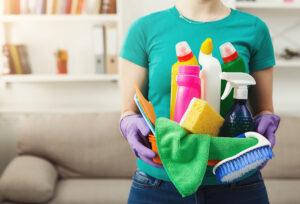Recently an article in CNN described that your cleaning supplies may contain hazardous substances. The Environmental Working Group (EWG) has analyzed more than 2000 cleaning supplies with substances that can affect your health. Among these problems are asthma, chemical burns and cancer risks. Tasha Stoiber is a senior scientist at the Environmental Working Group. She said: “Many people assume that when you’re buying something on the shelf or if it’s for sale in a store, that there’s no risk to it or they know exactly what they’re getting. That just isn’t the case.”
Need for cleaning supplies, but danger of poisoning your home
Brian Sansoni is the senior vice president of communications, outreach and membership at the American Cleaning Institute. He said: “The proper use of cleaning products contributes to public health and quality of life in homes, offices, schools, health care facilities, restaurants and throughout our communities every single day. Everyone who has dealt with the coronavirus pandemic or cold and flu season can certainly recognize this fact.”
Stoiber said: “People are becoming more aware of how these things can have an effect on our health. In the United States, there is really poor transparency.”
Many cleaning supplies contain volatile organic compounds.
They can irritate your eyes, nose and throat, and damage your liver, kidneys and central nervous system. The impact of these chemicals depends on how often you use them and to what degree. Often the concentration of volatile organic compounds indoors can be fairly high.
Cleaning safely
The EWG recommends that you look at all the cleaning agents that you are using.
- Replace cleaning agents that the EPA or EWG do not recommend. Gradually over time you will end up with a combination of cleaning agents that are more environmentally friendly and safe for use.
- Keep on vacuuming and dusting. This removes dried up chemicals that could be swirled up and inhaled. Regular cleaning removes air-born chemicals from the air making it much safer for you.
- Here is a link to recommendations by the EWG.
Stoiber said: “A lot of these chemicals … they don’t stay in products. And when they are deposited into dust, and then we either stir up that dust, inhale that dust, or it’s on our hands and we forget to wash our hands and eat, then we’re exposed to those chemicals through dust.”
Conclusion
There is a myriad of cleaning substances for your home that are not safe. The Environmental Working Group (EWG) has analyzed more than 2000 cleaning supplies with substances that can affect your health. They have developed a list of safer cleaning agents. They recommend to slowly remove some of the more aggressive, unhealthy cleaning agents with alternative, safer ones. Experts also recommend that you regularly vacuum and dust your living areas. This removes residues of cleaning agents that would otherwise become part of the dust. This can be swirled up and inhaled, which can cause airway irritations and asthma. Become more aware of safe cleaning agents and change unsafe cleaning agents with safer ones.







